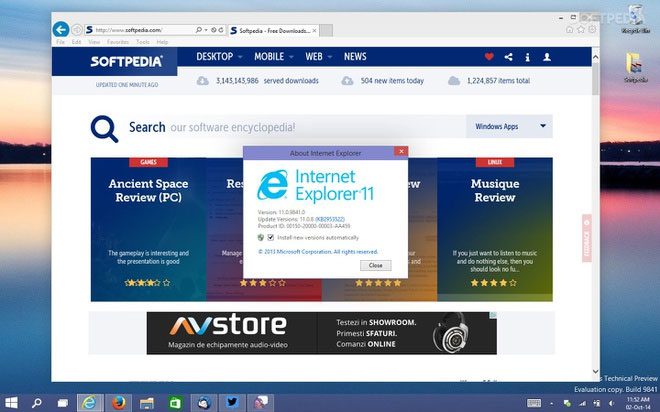The Internet Explorer browser on Windows 10 will cease operation starting June 2022, marking the end of its development and existence after more than 25 years.
Sean Lyndersay, head of the Microsoft Edge project, announced that Internet Explorer 11 on certain versions of Windows 10 will no longer be functional and will not receive updates after June 15, 2022, as users are encouraged to transition to the newer Microsoft Edge browser.
While the Windows 10 Long-Term Servicing Channel (LTSC) will still come with Internet Explorer pre-installed, future Windows 10 releases for consumers will no longer support this browser. According to The Verge, it is likely that Windows 10 versions released after June 2022 will not include Internet Explorer by default.

Internet Explorer 11 on Windows 10 will stop working from June 2022. (Image: Softpedia).
Despite the discontinuation of Internet Explorer, Microsoft has integrated a compatibility mode within Edge, allowing businesses to run older websites on the new browser. The company stated it will continue to support Internet Explorer compatibility mode in Edge at least until 2029.
The plan to discontinue Internet Explorer was announced back in 2015, when Microsoft Edge was first introduced on Windows 10. This is seen as an effort by the company to provide the best user experience.
Since then, Microsoft has referred to Internet Explorer as an “compatibility solution” for older websites and platforms rather than a conventional browser. Businesses are encouraged to switch to Microsoft Edge with Internet Explorer compatibility mode.
Last year, the web version of Microsoft Teams stopped supporting Internet Explorer 11. Starting August 17, services like Office 365, OneDrive, and Outlook will also no longer function on Internet Explorer 11.

Internet Explorer is an iconic product in the technology field. (Image: Getty Images).
Internet Explorer is an iconic product in the technology field. Launched on August 16, 1995, on the Windows operating system, it was the most popular browser in the world during the 2000s.
However, the emergence of browsers like Google Chrome, Safari, and Mozilla Firefox disrupted Microsoft’s monopoly, causing Internet Explorer to gradually lose its leading position.
“The number of Internet Explorer users has been steadily declining since 2013. We believe that the introduction of Microsoft Edge with open-source standards will lead to smoother and more innovative online experiences,” a Microsoft representative stated.





















































